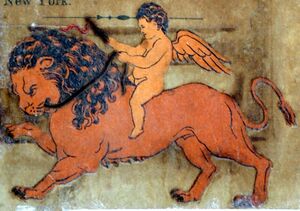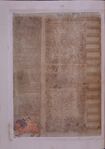< Elementaries (continued from page 4-91) >
...
Corresponding Secretary of the Theosophical Society
New York

The Soul, and How it Found Me
This is a book that every Spiritualist should read. Its effect on the large circle of general readers which Mr. Maitland’s literary reputation can command will probably be bewildering. From the vulgar critics who repeat the phrases whereby they have been taught to ascribe every super sensuous experience to morbid conditions, the author can of course only expect misrepresentation and insult. All the more prompt and cordial should be the expressed sympathy of the better informed with the accomplished scholar whose high quality of unselfish courage has given to a hostile public the avowals contained in this remarkable volume. Nor will their appreciation be limited to the testimony thus forcibly and fearlessly given. The facts recorded are of transcendent interest, some of them being strikingly and profoundly suggestive. Such is “the Vision of the Tree,” at p. 60, of the possibility “that there subsists between all living beings a bond of sympathy to which, if only the desire on one side reach an extreme degree of intensity, the other side maybe forced to respond by disclosing to view its animating idea;” as also, in the developed thought of the author/that this “idea” has an essential correspondence to and takes the form of personality. So, at p. 86, we have an account of a case of “transfer of thought” as remarkable as anything of the same nature ever recorded. Especially interesting and instructive is Mr. Maitland’s account of his transition from intellectual labour to spiritual receptivity. No abbreviation, no description at second-hand of this vivid picture, can do anything like justice to its force and impressiveness. But we may note two stages in the author’s development—the ideal and the personal. And it is worthy of remark, as showing how little an enthusiastic or “prevenient imagination” was concerned in the results, that Mr. Maitland seems not to have conceived the extraordinary and spontaneous access of ideas distinguishing the earlier stage of illumination to have been due to personal inspiration, until it was unmistakably impressed with the characteristics of a second intelligence in the later.
The book is an account of the production of the larger work, England and Islam, published by the author in the spring. Many, perhaps, will be of opinion with the present writer, that that work contains a mixture of much that is sublime and true in spiritual philosophy with political fallacies which seem strange in such a connection. Even if we were to accept, on the authority of this revelation, propositions involving very questionable assumptions, we should still revolt from the conclusion that it is the duty of England to aid in perpetuating cruel and oppressive misrule for a high and spiritual purpose. It may be that it is the mission of England to mediate the harmonious union of the eastern and the western peoples—of the masculine and the feminine elements of the human race; though it is not easy to see that in her long connection with India she has hitherto shown the least sympathy with, or influence over, or tendency to fuse the genius of her Oriental subjects. It may be that the passage of the Danube, by Russian armies, was the first step in a march to India, though it looks more like what it professed to be—the sympathetic junction of two members of the Slavonic race against the alien oppressor of one of them. But if England’s action is to be determined by moral considerations, is it not better that she should fight the battle, even at conceivable disadvantage, when and where those considerations are all on her side, than at a time and place at which her interference would mean the support of political wrong and injustice? We are left in some doubt as to the source from which Mr. Maitland believes himself to have derived his inspiration on this subject; but even if, as seems to be implied, he represents the soul of England (is it not rather the soul of Islam?) he may be reminded of his own teaching (England and Islam, p. 167), that there is yet a higher and a higher soul: that the soul of humanity is nearer to God, and therefore to right, and truth, and justice, than the soul of one of its collective members, and that the “Eastern Question” may be viewed from a higher standpoint than that represented by the tutelary spirit of one people.
Passing gladly from topics of political controversy, we come to the fundamental principle of Mr. Maitland’s philosophy—the doctrine of the soul. “It was by a process purely intellectual,” he tells us, “that I had come to regard the pantheistic hypothesis, which involved the reality and indestructibility of the soul, as a necessary truth.” His is not the Pantheism that negates the personality of God, sinking and exhausting the soul of the universe in its sensible activity and manifestation. He holds, on the contrary, the belief of all philosophical “mystics,” that the ideal is the real, and, with Spinoza, that God is the only substance. Not in the identity of God with Nature, but in his identity with man, does the author discover at once the fontal idea of religion, the proof of individual immortality, and the explanation of existence itself. He insists, of course, on that important distinction between the true and apparent self, without regard to which the idea would either be unintelligible, or would have no other significance for-idealism than the impersonal Pantheism of a natura naturans has for Materialism. The recognition of this distinction has always accompanied and characterized the escape of the religious consciousness from dogma and formalism into. the spirit. The new birth is nothing else or less than this recognition in experience.* How little of true personality there is in the ordinary consciousness will be apparent to any one who reflects on the preponderating influence of the external over our lives, and on the fact that even the opinions and sentiments which we regard as most truly our own, and characteristic, are for the most part held in obedience to moral and intellectual forces, which individual minds can neither determine nor resist. The theory of human automatism has much to say for itself in the sphere of the outer life. We find this outer life of sensibility and impotence constantly referred to by Behmen, St. Martin, and other theosophists, under the significant designation, Astral; whether it was that they were imbued with astrological ideas, or, as is more probable, that the science of astrology is derived from a deeper knowledge of man and the universe, which has never been wholly lost. Certain it is that the fatalistic element in life, which is the theme of much contemporary writing, was fully recognised in the old spiritual philosophies. Its recognition by modern thought is without any perception of transcendental freedom and personality. Nevertheless—and notwithstanding the train of materialistic consequences—logical and practical, which such a half truth necessitates, it prepares the conditions of I spiritual insight. It is better that for a time we should be taught to regard personality as an illusion, than that we should continue to confound the true and the apparent self, thereby inevitably accepting the phenomenal sphere of the latter as equally real and limitative. Of all the clergy and good people who speak familiarly of the soul, few probably have any other idea of it than as the subject of their temporal and habitual consciousness. To how many, for in- <... continues on page 4-93 >
* The writer cannot refrain here from a deprecatory reference to the materialistic perversion of this essential idea of religion by the Reincarnationists, who see in it only an explicit confirmation of their belief. This degradation of a sublime spiritual truth is the great blot in Lady Caithness’s otherwise very interesting and instructive book, Old Truths in a New Light.
Editor's notes
Sources
-
London Spiritualist, No. 273, November 16, 1877, pp. 230-2


